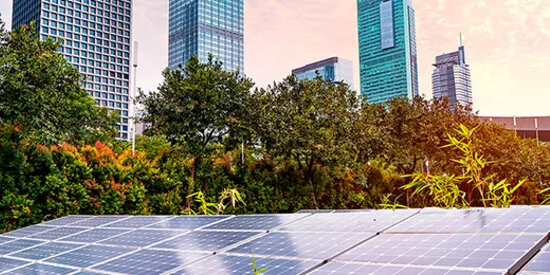
Asia Pacific’s sustainable finance market has reached a pivotal moment
As stakeholders push companies to become more sustainable, technology, regulation and national support measures are all evolving rapidly to make this possible, allowing investors to deploy more capital with greater certainty.
The sustainable finance market is booming. The worldwide outstanding amount of green, social and sustainability loans, bonds and similar instruments has exploded from less than $100 billion in 2015 to $4.5 trillion in 2022, according to Precedence Research1. Despite the reduction in annual activity for 2023, the value of this market is expected to grow by 20% a year for the next decade to reach almost $30 trillion by 2032. Much of that growth will come in Asia Pacific (APAC) as it catches up with Europe and North America and, in some areas, overtakes them. However, it’s not just the size of the market that gives us reason to be positive.
Our confidence is based on positive momentum in three fundamental and inter-connected areas.
Technology is advancing
First, APAC is playing a leading role in promoting new decarbonisation technology. Technological progress continues to accelerate, creating new industries and opportunities across borders. Many APAC companies are already global leaders in their respective technology and the region offers a large market to deploy these new decarbonisation levers at scale.
China today is not only the biggest manufacturer of solar panels, wind turbines and batteries; it is also their biggest user, with installed renewables capacity of 1,260 Gigawatts spanning solar, wind, hydropower and biomass. China is also the world’s biggest market for electric vehicles and successfully exports its electric vehicles and battery technology to the world. Meanwhile, Japan and South Korea are rapidly building up expertise and infrastructure for the production and distribution of clean fuels, including hydrogen, ammonia, e-fuels and carbon capture.
Australia, too, has vital mineral reserves which are critical for the transition as well as strong wind resources and abundant land for solar installations. The ability to develop vast quantities of renewable power will be fundamental to produce the green hydrogen and zero-carbon fuels needed to decarbonise hard-to-abate industries, transportation as well as the energy sector.
Capital is flowing
These advances are attracting growing amounts of capital, the second big trend. Investor preferences have shifted to favor opportunities which provide stronger sustainability profiles and outcomes.
Certainly, there are some nuances when it comes to quantifying this rise in investor appetite, but overall ESG factors are significantly more integrated into investment processes than in the past and have a larger influence on investment decisions than ever before.
Capital raising can be in the form of individual project finance as well as corporate transactions, while banks and investors can now leverage use-of-proceeds instruments such as green bonds or loans to finance individual projects or back companies as a whole – as long as they have green investments, ambitious net zero targets, and realistic and detailed transition plans.
Financial sponsors, insurers, asset managers to sovereign wealth funds can encourage corporations to embrace higher ESG standards and direct investment to where it will have the greatest impact. This goes beyond combatting climate change. PAG, one of Asia’s largest private equity and investment firms based in Hong Kong, recently closed a first sustainability-linked loan for its private credit fund, which will help PAG to incentivize its portfolio companies to enhance their own ESG maturity and credentials. Societe Generale acted as joint sustainability coordinator for the second time for PAG, following on from PAG’s first sustainability-linked loan for its private equity fund.
Policymakers are acting
Governments, indeed, are the third reason for our optimism. Across Asia Pacific, policymakers are spending more time, effort and resources on promoting sustainability, whether through subsidies and incentives, public investment programmes, or new and enhanced regulations.
In Australia, a holistic taxonomy for sustainable activities is now being developed with strong support from the government. Along with other policy initiatives detailed in the Government’s recent Sustainable Finance Strategy, we believe this taxonomy will act as a catalyst for a structural acceleration of the local sustainable finance market.
The rest of Asia is also making progress in this regard as many countries have set national decarbonisation targets and are now working on establishing the enabling policies across sectors. Action on greenwashing is also ramping up to keep companies and investors accountable for the commitments they make.
Momentum is building
All of this is helping the market to mature and evolve. A recent example is Societe Generale’s role as sustainability coordinator in helping Cromwell Property Group, an international real estate investor based in Australia, to design and implement a global sustainable finance framework. This will allow Cromwell to undertake sustainable finance transactions for their group entities globally.
Another showcase is Societe Generale’s role as arranger and green coordinator for New Zealand Green Investment Finance (“NZGIF”), the state-owned green bank tasked with accelerating investments in emissions reductions, to structure a repeatable financing solution. This will facilitate expansion of distributed solar generation in New Zealand. As part of this engagement, Societe Generale developed NZGIF’s corporate green financing framework and labelled its first solar finance issuance as green.
The pipeline of local and regional opportunities associated with the transition to net zero is showing no signs of slowdown, and the combination of technology advances, capital allocation and policy support across APAC indicate the best days for the region’s sustainable finance market are yet to come.
1. Precedence Research: https://www.precedenceresearch.com/sustainable-finance-market






